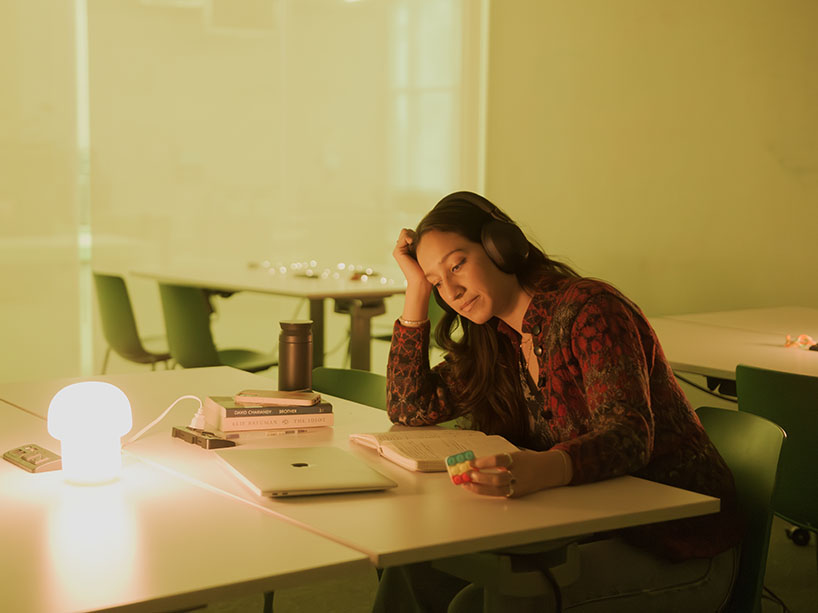How TMU’s low-sensory hours are transforming student study spaces

Students who would like quieter, lower sensory spaces to study on campus can come by SLC 451 and 449 for quiet snacks, fidget spinners, and no overhead lighting. Students who visit before the end of February can be entered in a draw for a $50 OneCard top up.
Students who are struggling to find quiet study places on campus need look no further – low-sensory hours are now being offered in the Student Learning Centre (SLC): at the study lounge at SLC 451 and the math hub at SLC 449.
In the spaces, the low-sensory hours offer dimmed lights, minimal distractions, quiet snacks, access peer academic coaches and fidget tools to aid students who need a bit of movement while studying.
“Our campus is located at one of the busiest intersections of Toronto, so finding quiet spaces to study could be tough,” says Meera Govindasamy, academic engagement specialist with Student Life and Learning Support. Her team collaborated with Academic Accommodation Support to diversify the study space on offer to students on campus.
The low-sensory hours offering aligns with TMU's mission to foster student well being and academic development by creating spaces that reflect diverse learning requirements. “Our Low-Sensory Hours recognize that many students are presenting this need,” says Govindasamy.

Students who have dropped into one of the low-sensory study spaces in the SLC have found that it's a great space for studying or even just reading a book.
The program has rapidly grown in popularity, with nearly 350 visits this past fall. “Because it's a drop-in program, lots of students have found the space, and this can be a low barrier to think about one's own learning experience,” she says. “This program may address the needs of some students registered with Academic Accommodation Support, but it's also a nice way to provide passive programming to all students. The nature of being a student is that focus is a challenge for every single student.”
Feedback from students has been overwhelmingly positive. Maryam Shah, a fifth-year Fashion student, said, "The soft lighting helps me concentrate much better without feeling overwhelmed. The low sensory hours provide a much-needed calmer setting, offering students extra space to work with added support from peer academic coaches. It's a more focused and stress-free environment."
Like other study hours, the low-sensory hours in the study lounge offer peer academic coach support. Even these coaches use the space in their own time and find it useful. “Sometimes students have questions about accommodations, or sometimes they just need a quiet space to read a book!” says Shabnam Gol, peer academic coach. “The last week of school before the winter break, I had to work on a presentation for a workshop that I’m hosting. And it's surprising to see how effective you are when it's low-sensory – you just work, you’re focused.”
“The environment provides an inclusive space for students to slow down and hopefully engage deeper in their work,” says Suzanne MacArthur, manager of inclusive learning in Academic Accommodation Support. “The presence of other students studying creates a collective sense of engagement and offers an opportunity for body doubling, for students who find that helpful. Or it can be a great space for students to take a quiet break.”
Students who are interested in attending one of the spaces during low-sensory hours, can stop by during the winter 2025 semester hours:
- Monday: 10 a.m. - 12 p.m. (in the math hub, SLC 449)
- Wednesday 10 a.m. - 12 p.m. (in the math hub SLC 449) and 2 p.m. - 5 p.m. (in the study lounge SLC 451)
- Thursday 11 a.m. - 2 p.m. (in the study lounge SLC 451)
- Friday 10 a.m. - 12 p.m. (in the math hub SLC 449)
Students who attend low-sensory hours before the end of February will be entered in a raffle for the chance to win 1 of 5 $50 Onecard top-ups.
For more information, visit the Student Life and Learning Support website.
